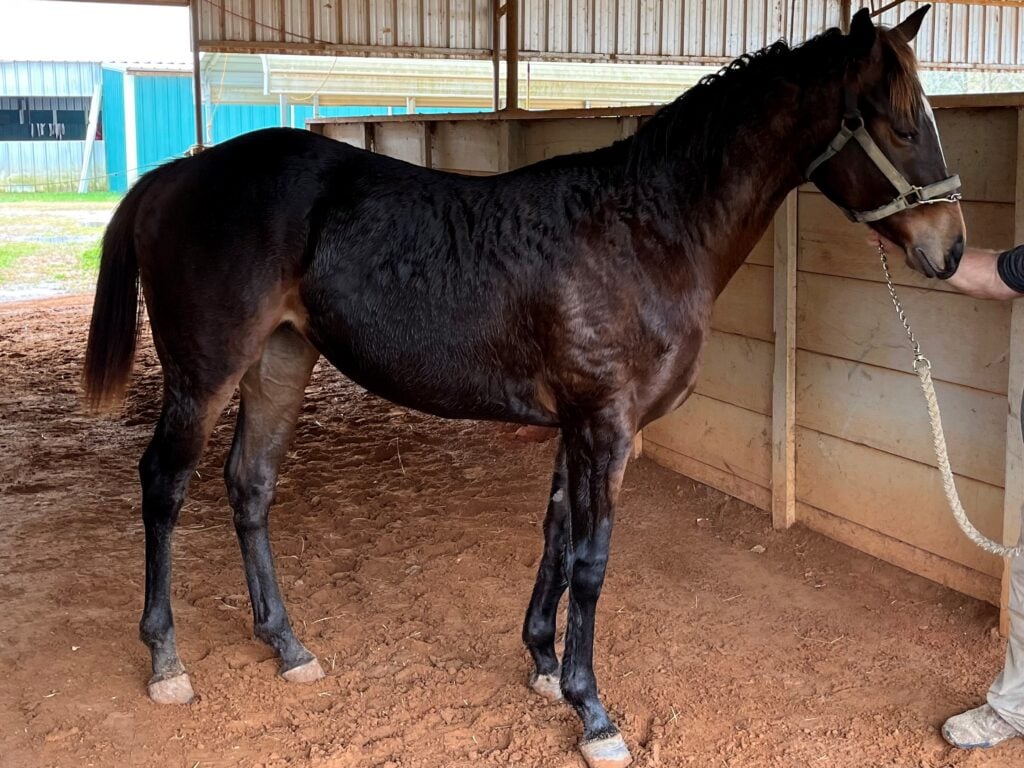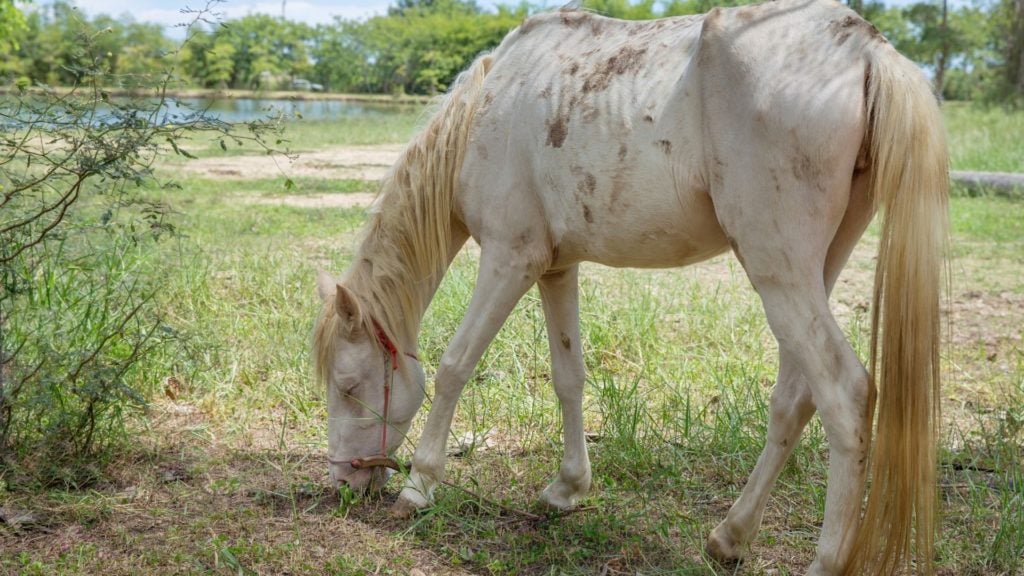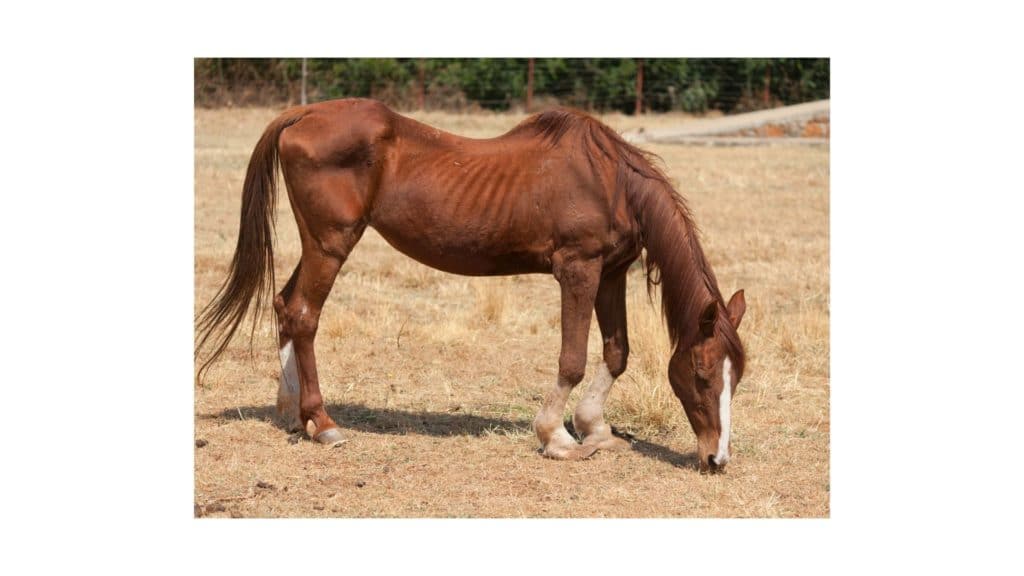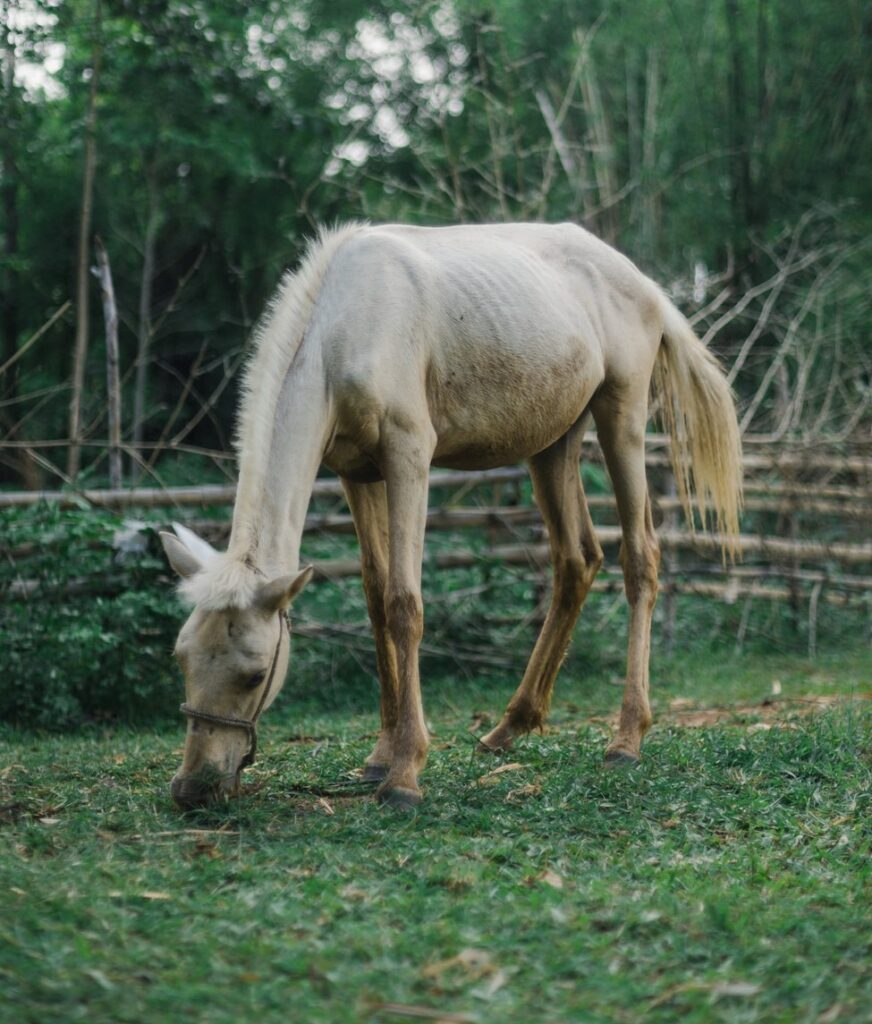Last updated: December 6, 2022
Any links on this page that lead to products on Amazon are affiliate links and I earn a commission if you make a purchase. Thanks in advance – I really appreciate it!
Horses like humans, get sick and lose weight, sometimes a lot of weight. After the sickness passes and they start to feel better, how do you know if your horse is still too skinny to ride?
Horses are too skinny to ride if they don’t have sufficient muscle to carry your weight or protect their back. To determine your horse’s fitness to ride, apply the criteria of The Henneke Equine Body Condition Scoring System (BCS).
Horses are individuals, and some that look too skinny to ride may be healthy. There is a lot of factors to consider before riding a thin horse.

Can a Horse be too Skinny to Ride?
Yes, horses can be too thin to ride, especially ones that have no meat over their top line. Riding a skinny horse can hurt it and cause unnecessary physical and emotional damage.
Riding an exceptionally skinny horse may extend the time it takes for the animal to return to a healthy weight. If you want to spend time with your underweight animal, and increase its fitness level, work with your horse on the ground.
Your main concern should be the health of your horse.
How do you know a horse is too skinny to ride
There are a few key indicators that a horse is too skinny to ride. First, take a look at the horse’s ribs. You should be able to feel them, but they shouldn’t be protruding. The horse’s neck should also have some definition, but it shouldn’t be skinny or bony.
Finally, look at the horse’s haunches. They should be well-rounded, without any sharp angles. If you’re unsure, it’s always best to err on the side of caution and consult a veterinarian before riding.
Another good method is to follow the Henneke Equine Body Condition Scoring System.
Henneke Equine Body Condition Scoring System (BCS)
You can ride a skinny horse if it has a BCS score of 4 or higher. It’s challenging to look at a horse and know if it’s too thin to ride or dangerously underweight because of the differences in horse’s frames, coat thicknesses, and breed conformation.
The BCS eliminates the guesswork by assigning a numerical value to the amount and location of fat on horses. The scoring requires a visual and palpation assessment of fat in critical areas of a horse.
The areas evaluated are the loins, ribs, tailhead, withers, neck, and shoulders. Each site is numerically rated based on the amount of fat, and then the numbers are added together to give the evaluated animal an overall rating.
The Body Condition Scoring System scale rates horses from 1 to 9, where horses rate a 1 as emaciated, and a horse rated 9 is obese. According to this scale, a horse with a score of 4 is considered moderately thin.
Most moderately thin horses have a crease along their back, and you can see a faint outline of ribs. You should be able to feel fat along the horses’ tailhead, and not be able to see its hip bones. Its withers, neck, and shoulders shouldn’t be obviously thin.
I wrote an article about equine obesity and include a much more detailed description of the Henneke Equine Body Condition Scoring System (BCS) with charts and diagrams I suggest you check out.

Why is it bad to ride a skinny horse
It’s understandable to want to start riding your underweight horse, but you need patience. Horseback riding burns calories, which leads to delayed weight gain or additional weight loss. So how important is it for you to ride?
Do you want to ride to keep your horse fit, introduce new training, or just because you feel like riding? If it’s a new horse, it’s vital to first understand the nature of the horse’s condition and its history.
If your horse is skinny but has a sound body and mind, you can ride lightly without much interference in its weight gain progress. However, extremely thin horses can be damaged physically and emotionally by riding.
It is generally considered bad to ride skinny horses for a number of reasons. First, skinny horses are more prone to health problems, such as malnutrition and dehydration.
They also tend to have weak bones and joints, which can be easily damaged by the weight of a rider. Additionally, skinny horses often have poor muscle tone, which can make them uncomfortable to ride and more difficult to control.
A skinny horse is weak, and riding too soon is dangerous for you and the horse. Your weight could cause the horse to stumble and fall. Thin horses carrying a heavy burden like a rider could also damage the muscle and tendons.
Horses need cushion across their topline to carry a saddle. An emaciated horse carrying a rider and saddle will be in pain and likely develop sores and bruising.
Finally, skinny horses are simply not as strong as their fuller-figured counterparts, and thus are more likely to tire quickly and become sore after extended periods of riding. For all these reasons, it is generally best to avoid riding skinny horses.

Why is Your Horse Skinny
Typically horses lose weight because they burn more calories than they take in. But, if your horse has a chronic weight loss issue, it’s likely due to a poor diet, health problems, parasites, disease, or its pecking order in the herd.
Diet
Horses are grazing animals, and because of this, forages such as hay and pasture grass are their primary dietary component. If your horse has adequate access to hay and pasture grass and is still losing weight, then it’s likely low-quality forage or you’re not feeding enough hay.
A typical adult horse needs to eat a minimum of 2% of its weight per day in dry hay. If your horse isn’t getting this minimum daily requirement of hay, it can continue to lose weight.
If you’re feeding an adequate amount of hay and the horse continues to lose weight, the hay may be of low quality. To remedy this, you need to provide better quality hay or put the horse in a pasture with nutritious grass.
You may also need to supplement your horse’s diet with a grain concentrate feed to ensure it’s getting the vitamins and minerals it needs. How you feed, your horse is vital to its well-being. Nutrition and equine performance go hand in hand.

Health problems
Equine dental disorders and equine parasites are two common problems associated with equine weight loss. Horses with dental problems don’t chew their food sufficiently for their body to extract nutrients. Another issue related to bad teeth is the ability to keep feed in their mouth.
Often horses with bad teeth can’t keep feed in their mouth and fail to swallow. Get your horse’s teeth checked so you can correct the issue or rule it out as the source of your horses’ weight loss.
Internal worms cause a horse to lose weight. De-worming medication should be given to all horses regularly. To ensure your horse doesn’t have worms, have it tested by a veterinarian for parasites and start a parasite control program.
Dental and parasites are the most common health issues associated with weight loss, but they are not the only ones. Many diseases can affect a horse’s ability to keep weight, such as Cushing’s, cancer, and even lameness.
If you suspect your horse is suffering from a disease, have it thoroughly examined by a qualified veterinarian. Chronic weight loss can lead to loss of muscle mass, sickness, and in extreme cases, death.
It takes time to put healthy weight on a skinny horse, but with patience, high-quality food, and a well-thought-out plan it can be done.
Social interactions
Herd animals typically have a leader of the pack that acts like a bully to the other members of their group. These bully tendencies are exhibited most aggressively during feeding time. Weaker members of the herd are pushed from their feed and not allowed to eat.
To ensure your horse is eating, monitor his feed. Separate it from other horses and allow ample time to eat. Feeding a horse safely from the dominant horses ensures each horse gets the appropriate nutrients it needs and also reduces stress.
Horses that compete for their food are susceptible to developing stress and associated health problems, like ulcers and colic.
Here is a helpful video about the development of the topline muscle on horses:
Related articles:
- Is My Horse Overweight? A Plan to Reduce Weight Safely
- What does a Horse Eat? An Essential Guide
- What is Horse Abuse? Critical Information You Need to Know
- How to Warm-Up a Cold Horse in 3 Easy Steps

About the Author: Miles Henry
Lifelong Horseman | Racehorse Owner | Published Author
Miles Henry brings over 25 years of hands-on experience training and owning Thoroughbred racehorses. Raised with Quarter Horses and Appaloosas, he’s spent a lifetime learning from horses—on the track, in the barn, and in the field. Today, he runs a small but successful racing stable in Louisiana and shares real-world insights on HorseRacingSense.com, helping horse owners, fans, and bettors navigate the sport with confidence.
📚 Books: View Miles’s books on Amazon »
🎧 Podcast Guest: Animal Tales Ep. 32 |
YouTube Interview
📩 Newsletter: Sign up for racing tips and horse care advice »
🔗 Follow Miles:
Twitter |
Facebook |
YouTube


